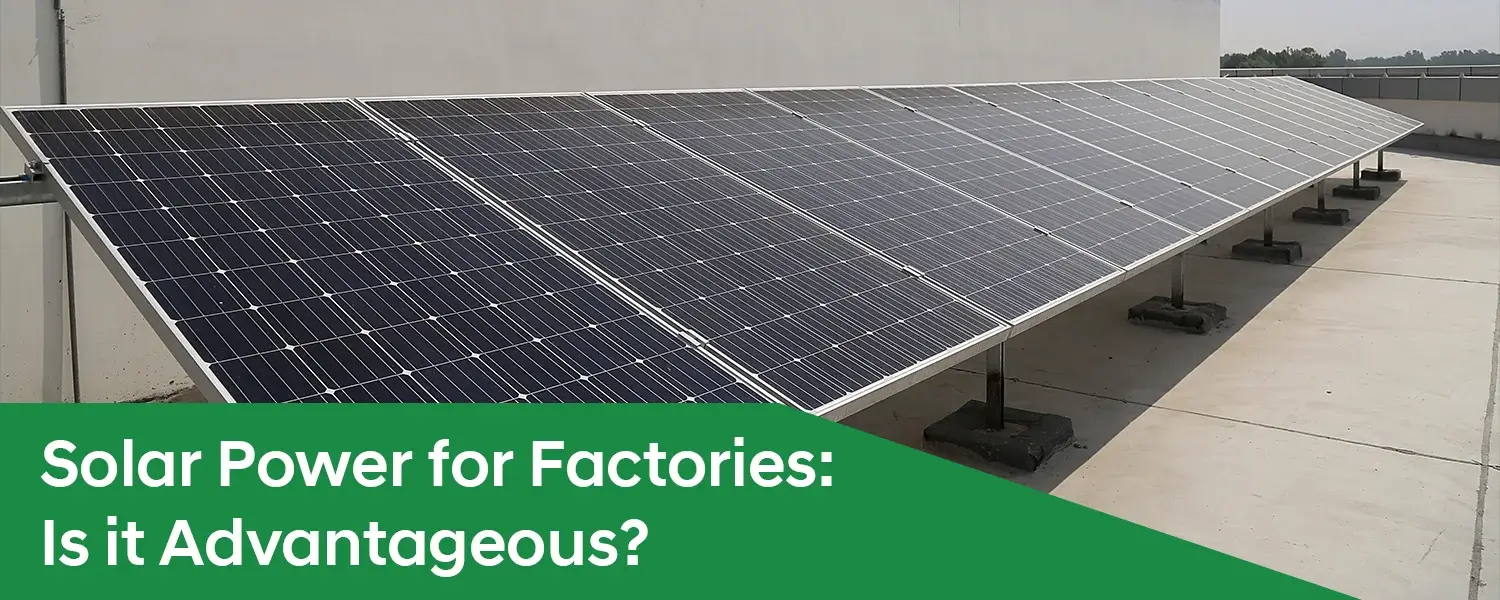As a factory owner, are you considering the utilization of solar power for your factory? If so, I can provide you with compelling reasons to support this wise decision. Switching to solar power is beneficial for any factory, as factories are highly dependent on electricity.
In this blog, we, as the professional solar panel installer in the UK, will explain how solar power for factories is advantageous.
How Can Using Solar Power For A Factory Be Beneficial?
There are many benefits of using solar power for factories. For example, it cuts the power bills, it is good for the environment, it fulfills the social responsibility of the factory owners, etc. Let’s first discuss the financial benefits of using solar power for factories.
Financial Benefits Of Solar Power For Factories

1. Reduced Operational Costs
Factories are energy-intensive operations, and conventional electricity costs can be a substantial part of their operational expenses. By investing in solar power, factories can drastically reduce their electricity bills. Solar panels generate electricity from sunlight, which is free, making energy costs more predictable and manageable over the long term.
2. Return on Investment (ROI)
While the initial setup costs for solar panel installation might seem significant, the long-term return on investment is remarkable. Over the years, the savings from reduced energy bills can offset the installation costs, leading to substantial cost savings. In many cases, factories can achieve ROI within a relatively short period.
3. Government Incentives and Tax Benefits
Governments around the world often provide incentives to promote renewable energy adoption. These incentives might include tax credits, grants, and subsidies. Factories investing in solar power can take advantage of these programs to significantly lower their upfront expenses, making the transition financially appealing. In the UK, the government provides tax incentives to encourage solar power adoption by factory owners.
These included Enhanced Capital Allowances (ECAs) for immediate tax deductions on energy-saving equipment, the Feed-in Tariff (FiT) for renewable electricity generation, the Renewable Heat Incentive (RHI) for heat generation, business rates relief, a reduced 5% VAT rate on installation costs, Climate Change Levy (CCL) exemption for self-generated renewable electricity, and potential Research and Development (R&D) tax credits for innovative energy projects.
4. Revenue Generation through Excess Energy
Solar power systems often generate more energy than a factory consumes during peak sunlight hours. This excess energy can be fed back into the grid through net metering, allowing factories to earn credits or even revenue from their local utility company. This further enhances the financial viability of solar power adoption.
Environmental Benefits Of Using Solar Power For Factory:
Now, let’s come to the environmental benefits of switching to solar power for the factories:

1. Reduced Carbon Footprint
Solar power is a clean energy source that produces zero emissions during its operation. By utilizing solar energy, factories can significantly reduce their carbon footprint, contributing to global efforts to combat climate change. This aligns with the growing demand for businesses to take active steps towards sustainability.
2. Decreased Air and Water Pollution
Conventional electricity generation, often reliant on fossil fuels, contributes to air and water pollution. By transitioning to solar power, factories can help reduce the emission of pollutants such as sulfur dioxide, nitrogen oxides, and particulate matter. This leads to improved air quality and a healthier environment for surrounding communities.
3. Conservation of Natural Resources
Solar power does not require the consumption of finite resources like coal, oil, or natural gas. By harnessing energy from the sun, factories can contribute to the conservation of these valuable resources, ensuring their availability for future generations.
4. Biodiversity Preservation
Reducing pollution and resource consumption has a positive ripple effect on ecosystems and biodiversity. Solar power adoption can contribute to the preservation of habitats and wildlife, ensuring a more balanced and sustainable environment.
Resilience and Risk Mitigation Benefits
1. Climate Resilience:
Solar power is a good choice for climate resilience because it is less affected by climate disruptions than other energy sources that can be interrupted by supply chain issues.
2. Risk Diversification:
Using solar power can help factories reduce their dependence on fossil fuel imports, which can be volatile and pose geopolitical risks.
Regulatory And Compliance Benefits Of Using Solar Power For Factory:
1. Meeting Renewable Energy Targets:
Many regions and industries have renewable energy targets or mandates. Solar power adoption helps factories fulfill these obligations and avoid penalties or reputational damage.
2. Regulatory Compliance:
Factories that embrace solar power can navigate future regulatory changes more effectively, positioning themselves ahead of potential stricter emissions regulations.
Final Words:
So, you can see that solar power is beneficial for factories, and factory owners have the power to make a positive impact on both their profits and the environment. The advantages are clear: reduced operational costs, impressive ROI, government incentives, and revenue from excess energy. The environmental gains are also important, such as reducing carbon footprints, minimizing pollution, preserving resources, and protecting biodiversity.
If you are looking for solar power for your factory then contact Arc One today. Solar power’s resilience against disruptions and compliance with regulations add layers of security and foresight. By adopting solar, factories aren’t just adapting to change; they’re driving change—towards cleaner, greener, and more responsible industries. This shift isn’t just about powering factories; it’s about powering progress and paving the way to a brighter, more sustainable future.

